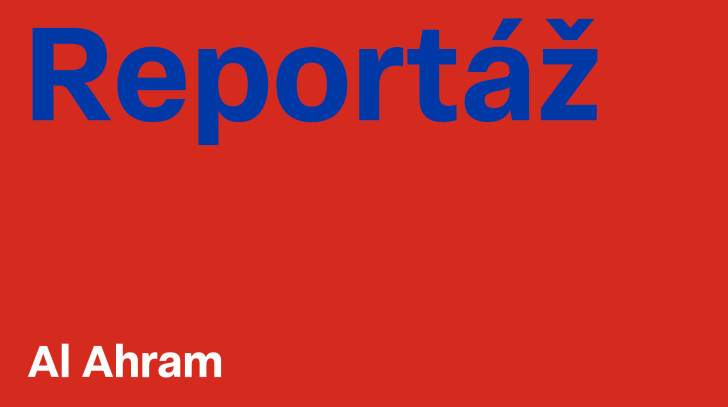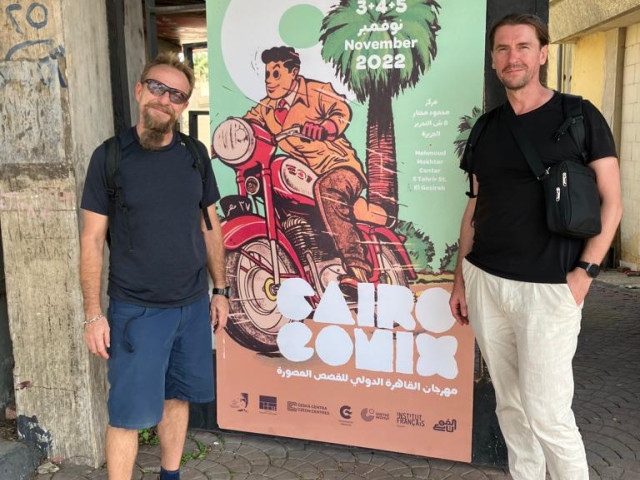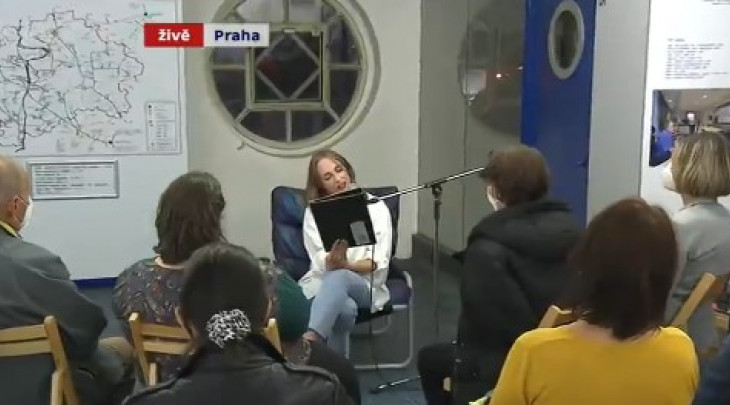Jiří Šimáček and Ján Lastomírsky guests at Cairo Comix
- 13. 11. 2023
- In media
- 5 minute read
- Source: Al-Ahram

The Czech-Slovak creative duo Jiří Šimáček and Ján Lastomírsky, authors of the comic Article II, appeared as guests at the 8th CairoComix. They answered great questions to an informed audience, but also revealed their own creative processes. At the same time, their talk was also a little excursion into Czechoslovak history, as the main character of the award-winning and Muriel Award-winning comic Article II is chaplain Vladimír Petřek, who hid a group of paratroopers in his church after the assassination of R. Heydrich during World War II. At the same time, Jiří and Ján were interviewed by the Egyptian daily Al-Ahram, which published a large interview with them.
Jiří Šimáček + Ján Lastomírsky
The legendary Stan Lee has admitted how he has suffered for long time from people looking down on Comics as a work of creative art, do you think this has changed in present time, and if so what contributed to this change?
The social prestige of art and art forms is highly variable in space and time. It is something that is completely out of our control, so we don't pay much attention to it. For us as artists, working on comics simply brings us satisfaction, and we wish work satisfaction for absolutely everyone, whether they're an artist, a teacher, a driver, a businessman, just whatever they do.
Do you think Comics can work as a medium of change socially and politically?
Every work of art has the potential to change the mental setting of the reader or viewer. Changes in mentality and thinking inevitably lead to social development. But predicting how and which work will resonate with society at a given time is a difficult task; most of the time these are subtle processes.
Don't you think comics is one of the main fields threatened by quick developments in entertainment and AI?
We think that the products of artificial intelligence are in fact a jumble of searches and the work of various randomnesses that lack the essential. Any artwork reflects the way we communicate with each other as humans. We see no reason why human communication should be replaced by machine communication. We cannot imagine yet that artificial intelligence could be a good storyteller that would engage the listener over tea.
How is your impression of your visit to Egypt?
We both went outside of European territory for the first time in our lives and it was straight to Cairo. So we guess it's understandable that Egypt is an encounter with a whole new world for us and we experience some moment of surprise at every turn. From the very first moment we perceive the extraordinary variety and diversity of every street and place. Compared to the somewhat reserved Europeans, we are also pleasantly surprised by the communicativeness and friendliness of the people we meet.
What you impression of the comic field and artists you met during the Cairo COMICS?
There are similar festivals like CairoComix in our country. And we see more commonalities than differences in the festival. What unites these festivals of comics is that they are a meeting place for absolute enthusiasts and admirers of comics. Most of the people who attend comic book festivals are very knowledgeable and have a huge insight into comics. This is unique to comic book fans and we think they are often more insightful than, say, the audience at theater and music festivals.
Did this visit inspired you with any plots or paved the way for certain projects of cooperation?
We felt that the audience responded well to our talk about comics. We definitely need to think about how and if it would actually be possible to bring our comics to an Arab audience. I guess we will try to be open to any possibilities and time will tell what we can get out of our Egyptian journey.
Questions for Jiří Šimáček
Has working as TV director helped your work on Comics?
If one works for television, one is forced to deal with different formats. And one has to adapt to different lengths of time - from a one-minute spot to a several-hour programme. This will develop a certain ability for flexibility and perhaps craftsmanship. The ability to be concise, to be able to express anything in a small space, to balance visual and textual information is important when writing a comic. So television is actually a fairly good teacher of craftsmanship.
Also what guarantees success for a comic book in your opinion and does wining a prize means the work is received positively by the readers?
The basis of the quality of a comic book, or even a novel or film, is always a good story. The story is what happened or what could have happened or could happen. You just cannot arbitrarily make up a story. A story comes to the author like a melody comes to a musician. It cannot be invented, only recorded and developed with respect and craftsmanship. For me, success in the first stage is the feeling that I have written the story to the best of my ability, and success in the second stage is the interaction with the reader. In other words, when the reader learns something about themselves or the world as a result of interacting with the work - that's success.
Questions for Ján Lastomírsky
Has studying history helped you in looking for certain details in your work?
Of course, yes, as an originally trained art and history teacher I am interested in historical topics. Drawing a historical comic always involves a bit of research work in addition to the artistic work; you can't do without the patience of a teacher and the curiosity of a historian.
You have a vast experience for working with the gaming field and cartoons, and of course comics. do you think which field is more satisfying for an artist?
The most satisfying thing for me is working on comics. Each of these mediums has specific requirements, and comics strikes me as the most complex of these mediums as an illustrator. It requires mental shortcuts, reductions. At the same time, the emotions of the characters can be expressed very well through comics.
You could be interested in
Literature Night
Literature Night - books by contemporary European authors performed by well-known actors. Ondřej Pavelka, Lenka...

